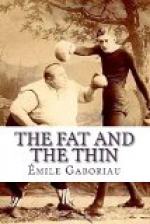Quenu, when two and twenty, was distressed with anguish when his brother did not return home. On the following day he went to seek his corpse at the cemetery of Montmartre, where the bodies of those shot down on the boulevards had been laid out in a line and covered with straw, from beneath which only their ghastly heads projected. However, Quenu’s courage failed him, he was blinded by his tears, and had to pass twice along the line of corpses before acquiring the certainty that Florent’s was not among them. At last, at the end of a long and wretched week, he learned at the Prefecture of Police that his brother was a prisoner. He was not allowed to see him, and when he pressed the matter the police threatened to arrest him also. Then he hastened off to his uncle Gradelle, whom he looked upon as a person of importance, hoping that he might be able to enlist his influence in Florent’s behalf. But Gradelle waxed wrathful, declared that Florent deserved his fate, that he ought to have known better than to have mixed himself up with those rascally republicans. And he even added that Florent was destined to turn out badly, that it was written on his face.
Quenu wept copiously and remained there, almost choked by his sobs. His uncle, a little ashamed of his harshness, and feeling that he ought to do something for him, offered to receive him into his house. He wanted an assistant, and knew that his nephew was a good cook. Quenu was so much alarmed by the mere thought of going back to live alone in the big room in the Rue Royer Collard, that then and there he accepted Gradelle’s offer. That same night he slept in his uncle’s house, in a dark hole of a garret just under the room, where there was scarcely space for him to lie at full length. However, he was less wretched there than he would have been opposite his brother’s empty couch.




